Iranian Lawmaker Calls New Punitive Hijab Bill ‘Compassionate’
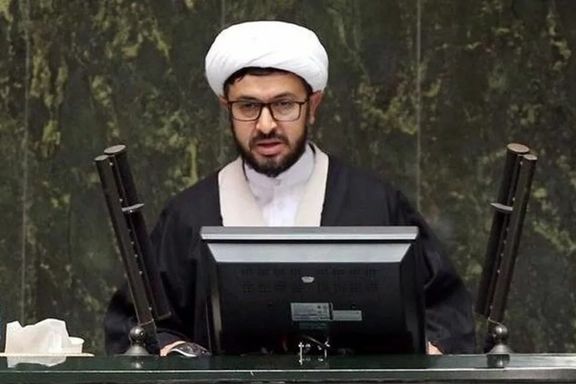
An Iranian lawmaker, involved in drafting Iran’s controversial new compulsory hijab bill, claims it is "compassionate" in nature.

An Iranian lawmaker, involved in drafting Iran’s controversial new compulsory hijab bill, claims it is "compassionate" in nature.
The bill, imposing severe punishments on women and girls for not wearing the mandated hijab, has previously been described by UN experts as constituting "gender apartheid."
"It's crucial for the public to recognize that the approach in the legislation has been gentle from its inception," said Mehdi Bagheri.
The bill, officially titled "Protection of Family Through Promotion of Hijab and Chastity Culture," initially secured parliamentary approval in September 2023.
Encountering an unexpected setback, the proposal faced rejection from the Guardian Council, which holds ultimate legislative authority. The council cited alleged formal deficiencies and called for revisions to clarify ambiguous terms.
The regime’s focus on the country’s hijab law comes amidst numerous reports of Iranian women refusing to adhere to the regime’s Islamic dress code after nationwide protests in 2022 erupted, following the the killing of Mahsa Jina Amini in the custody of so-called morality police for reportedly not wearing her hijab properly. The months-long protests marked the largest uprising since the establishment of the Islamic Republic in 1979.
Highlighting an intensifying trend of harsh penalties against women, the bill proposes travel restrictions and other methods of punishment.
Bagheri, whose political influence has waned in recent elections, also proposed that under the latest version of the “hijab and chastity” bill, judges could impose penalties such as hindering promotions or initiating temporary or permanent dismissals from service for female employees.
Bagheri also emphasized the possibility of imprisonment for women resisting the compulsory hijab.
Senior figures and clerics in the Iranian regime have continued to stress the significance of enforcing the compulsory hijab for women – with many arguing that it is one of the main pillars of the Islamic Republic.
Supreme Leader Ali Khamenei labeled it a "religious duty" on April 3, condemning any attempts to challenge its enforcement within Iran. Khamenei attributed such challenges to external influences aimed at undermining societal norms regarding hijab, emphasizing that even women not adhering to Sharia law are obligated to observe compulsory hijab.

A second night of apprehension in Tehran and Tel Aviv passed eventless Thursday, as the US and Britain vowed to back Israel in case of an Iranian retaliatory attack.
Reports from American and Israeli sources pointing to a ‘significant’ operation against Israel first emerged on Wednesday and spurred regional and world leaders to call for restraint and de-escalation.
Officials from Russia, Germany (and even Australia) intervened in different ways to dissuade Iranian leaders from striking back at Israel in response to the targeting of Iran’s consulate in Damascus on April 1st, which killed seven military officers, including two top Revolutionary Guards commanders.
But Iran continues to threaten a retaliatory attack, albeit in a relatively less incendiary fashion that was originally believed.
President Joe Biden and senior officials in his administration have repeatedly affirmed “ironclad” support for Israel against Iran. An Al Jazeera report Thursday evening quoted an unnamed American official that the US does not “rule out launching joint retaliatory strikes [against Iran] with Israel if it is attacked by Iran or its proxies.”
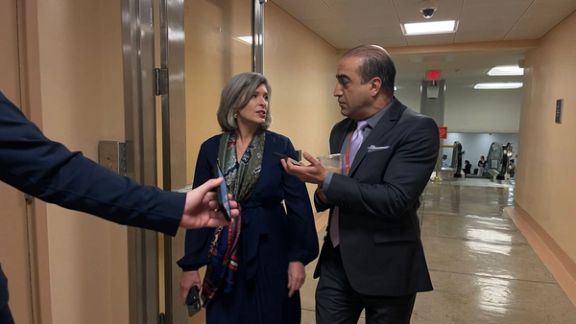
Republican Senator Joni Ernst (R-IA), a critic of the Biden administration’s policies toward Iran, expressed gratitude for President Biden’s message of support. “I think the warning was very strong. I am thankful that President Biden did that, but the proof is in the pudding; what are we going to do to step up and make sure we are defending Israel. That’s incredibly important,” told Iran International.
Reuters quoted a source familiar with US intelligence that Iran has “been very clear” that its response to the Israeli attack on its consulate in Damascus would be “controlled,” “non-escalatory,” and through “regional proxies” –as opposed to launching missiles directly from Iran. This was also reported by Politico, which suggested Iran may be calibrating its strike against Israel to send a message but not compel Washington to respond.
If true, the slight change of heart in Tehran could be the result of US warnings in public and through regional intermediaries such as Qatar and Saudi Arabia.
Iran’s Supreme Leader Ali Khamenei and his top military commanders in the IRGC know that a full-scale war with Israel could involve the US and have severe consequences that may far outweigh any gains in prestige in the Muslim world that comes with standing up to Israel.
While warning Iran that it may have to face not just Israeli army but American military might, the Biden administration is trying hard to stop a full-blown regional war.
“We continue to work to prevent escalation of the conflict in the Middle East,” State Department spokesperson Matthew Miller told in his presser Thursday. “Escalation is not in anyone's interest and countries should urge Iran not to escalate.”
Despite his best efforts to manage what can easily turn to an historic crisis, President Joe Biden faces unrelenting criticism at home for his Middle East policy.
Israel and Iran have been engaged in indirect conflict since October 7th, with Israel striking IRGC-affiliated targets in Syria, and Iran’s most powerful ally Hezbollah launching attacks across the Lebanese-Israeli border. Israel’s attack on Iran’s consulate in Damascus elevated the level of hostilities and raised concerns that direct confrontation between the two countries might be unavoidable.
“This should come as a shock to no one, but Iran is threatening Israel because they smell weakness from the Biden administration,” Congressman Brian Mast posted on X. “Iran wants escalation because they fear no consequences. Until this changes, the U.S. and our allies can only expect more aggression from Iran.”
Congresswoman Nancy Mace seconded the sentiment: “Make no mistake: @POTUS playing footsie with Iran and talking out of both sides of his mouth is the reason they feel emboldened.”
Biden critics have long blamed him and his team (his Iran team especially, led by the now suspended former Special Envoy Robert Malley) for emboldening the Iranian regime and ‘enabling’ it through released funds and loose enforcement of oil sanctions.
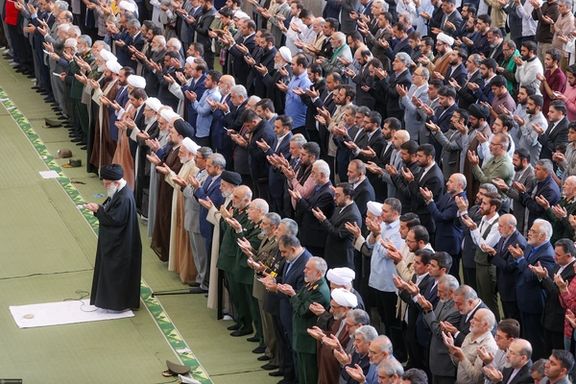
Mohammad Saeedi, the Friday Prayer Imam of Qom appointed by Supreme Leader Ali Khamenei, has cautioned against sowing discord among insider figures of the Islamic Republic.
Using the harsh rhetoric often heard among Iranian hardliners, Saeedi remarked: "We should sever the hands of those who sow discord, as there are far too many such hands in Iranian society.”
However, those involved in sowing discord in Iran are predominantly individuals from Khamenei’s inner circle. Iranian journalist Mehrzad Danesh observed in a tweet that since the Iranian New Year which started on March 20, there have been four corruption and other controversies all of them originating from the same camp.
The first week of the New Year was all about a land-grabbing case by Tehran's Friday Prayer Imam, Kazem Sedighi. The second week was marked by Tehran Mayor Alireza Zakani's idea to build a mosque in a park in northern Tehran neighborhood where there are already several mosques.
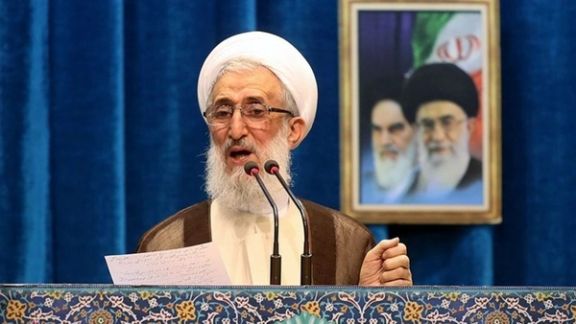
In the third week, attention turned to the offensive remarks directed at the Prophet of Islam and his son-in-law Ali, the first Imam of the Shiites, made by Alireza Panahian, a cleric closely associated with Khamenei's headquarters and President Ebrahim Raisi's administration. The following week, social media activists exposed a scandal involving a former state TV superstar accused of physically and emotionally abusing multiple women.
While these incidents sparked division among the ruling class and harsh criticism within Iranian society, it's noteworthy that those involved were often individuals associated with Khamenei and his affiliated institutions.
Sedighi claimed he made a mistake by land-grabbing and in fact embezzling the assets of a state sponsored seminary where he is the dean, and later claimed that he has returned the assets to the seminary without presenting any evidence. Although many clerics and politicians called for his resignation from his various government posts and positions, Khamenei kept him close to him and placed the cleric next to himself in a public meeting.
Zakani was accused by many on social media of planning to develop and own a shopping center attached to the mosque but no investigation has been yet carried out about the case and it is not likely to be carried out later.
Panahian, only apologized to one Tehran cleric for making the comments about the prophet and his son in law but nothing happened to him while others could have been executed for such comments. Instead, he was observed attending a high-profile economic meeting with President Raisi.
The celebrity received protection due to the perceived sanctity of state TV, overseen by Khamenei, whose integrity is considered nearly sacrosanct. None of those implicated in the four cases have ever faced official accusations of societal division or discord sowing, or any wrongdoing for that matter.
It appears that what the Friday prayers imam of Qom has said about preventing discord is more about individuals who are no longer in Khamenei's inner circles and sometimes make comments about religious matters that are not consistent with Khamenei's teaching and practices. Individuals such as Former President Mahmoud Ahmadinejad who has recently harshly criticized Iran's top clerics accusing them of only minding the appearances of religion and ignoring authentic religious values such as justice and respect for human dignity.
Ahmadinejad, who professes to be a devout Muslim, commented in a video, stating: "In our religious centers, they barely discuss monotheism. They dedicate years to details like ablution procedures, but remain silent on monotheism, justice, freedom, and human dignity. Yet, religion exists to champion these ideals. Without them, a religion loses its essence. The entire Quran revolves around these principles. Human freedom embodies monotheism in both individual and societal life."
The former president added: "The prophets have come to set human beings free. Man's personality will be completed when he benefits from these characteristics and values. Man will be complete by being free."
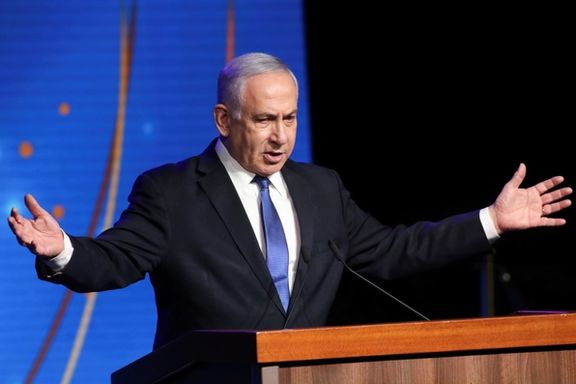
Israeli Prime Minister Benjamin Netanyahu readied the country's air forces on Thursday as Iran continues to levy threats againsts the Jewish state in the wake of its airstrike on Iran's consulate in Syria last week.
Addressing F-15 pilots in the Tel Nof air base, Netanyahu stressed that Israel has readied itself for all scenarios in the region in the wake of the most humiliating attack on Iran in recent years as the shadow war between the two states continues.
“We are in challenging times. We are in the midst of a war in Gaza that is continuing with full force. In addition, we are continuing with ceaseless efforts to return our hostages, but we are also preparing for challenges from other fronts," he said Thursday.
“We set a simple principle: Anyone who hits us, we hit them. We are ready to fulfill our responsibilities towards Israel’s security, in defense and attack."
His remarks came a day after Iran's Supreme Leader, Ali Khamenei, said that Israel "must be punished and it shall be" for the April 1 attack in Damascus, the most brazen attack on top IRGC personnel since the assassination of Quds Force chief Qassem Soleimani by the US in 2020.
The precision missile strike claimed the lives of 7 IRGC forces, including Mohammad Reza Zahedi, the highest-ranking commander of the Iranian Revolutionary Guards Quds Force (IRGC-QF) in Lebanon and Syria.
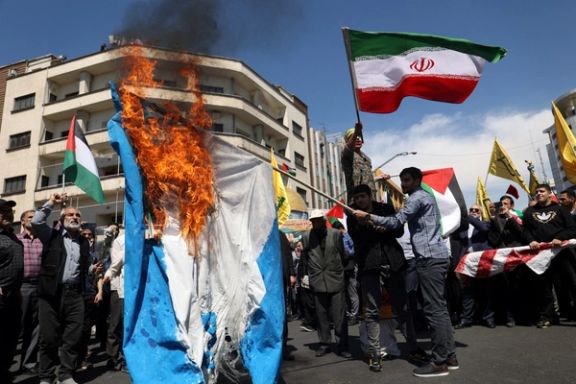
Michael Erik Kurilla, the head of US Central Command (CENTCOM), arrived in Israel where he is scheduled to meet the country’s senior military officials, including Defense Minister Yoav Gallant as the two nations, both archenemies of Iran, discuss contingency plans.
On Wednesday, the foreign ministers of Saudi Arabia, Qatar, Iraq and UAE, key economic allies of Iran amid sanctions, contacted their Iranian counterpart Hossein Amir-Abdollahian in an intervention to persuade Tehran to avoid further tensions with Israel as an Iran-led proxy war spills into the region in the wake of the October 7 Hamas invasion of Israel.
The Iran-backed militia has since been joined by Iran's proxies in Lebanon, Yemen, Iraq and Syria in attacks on both Israel and US forces in the region. The mediation of the four Arab countries was conducted at the request of Brett McGurk, the White House Middle East envoy.
Multiple international diplomats have tried to stem the tide of violence since the attack. In a phone conversation with Amir-Abdollahian, Australian Foreign Minister Penny Wong urged Tehran “to use its influence in the region to promote stability, not contribute to escalation.”
“Australia is deeply concerned by indications Iran is preparing military action against Israel,” wrote Wong on X, adding that “further conflict will only add to the devastation in the Middle East.”
Earlier in the day, German Foreign Minister Annalena Baerbock also talked to her Amir-Abdollahian and called on “all actors in the region to act responsibly and exercise maximum restraint.”
Iran, named as the biggest state sponsor of terror in last year's annual US terrorism report, lambasted the UN Security Council for failing to take action against Israel’s attacks on the IRGC targets in Syria.
“Had the UN Security Council condemned the Zionist regime’s reprehensible act of aggression on our diplomatic premises in Damascus and subsequently brought to justice its perpetrators, the imperative for Iran to punish this rogue regime might have been obviated,” Iran’s Permanent Mission to the UN stated.
According to the Financial Times, suspected Israeli strikes have claimed the lives of 18 IRGC commanders and advisers since the Gaza war broke out on October 7 as the shadow war between the two sides continues to boil over.
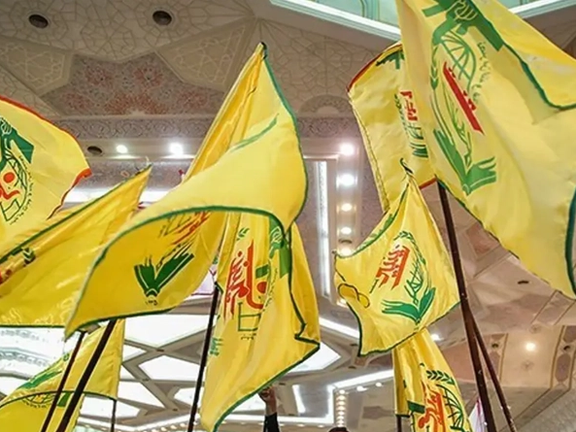
On Thursday, Islamabad designated the Zainebiyoun Brigade, an Iran-backed Shiite militant group, as a terrorist organization.
Formed by the IRGC after the Syrian civil war began, the Zainebiyoun Brigade, also known as Liwa Zainebiyoun, mobilized Pakistani Shiite militants who were then sent to fight forces opposed to Syrian ruler Bashar al-Assad, a close ally of Iran and Russia.
The Iranian regime has been an active actor in the Syrian conflict which started in 2013 and has so far claimed the lives of around 500,000 people, at least 60 percent of whom were civilians.
To help maintain Assad’s rule, Iran dispatched its other proxies to Syria as well, including Hezbollah, Iraq’s Nujaba Movement, and also the Fatemiyoun Division, which was composed of Afghan Shiite fighters.
Iranian officials and state media frequently credit former IRGC commander Qassem Soleimani as the man behind launching, training and funding all these militant groups. Soleimani, who served as the Iranian regime’s top military and intelligence operator in the Middle East, was killed in a US drone strike in January 2020 in Iraq’s capital, Baghdad.
Observers contend that Tehran’s attempts to mobilize Shiite militant groups, such as Zainebiyoun, and their active participation in the Syrian war fanned the flames of sectarian violence in the Middle East, provoking Sunni communities to employ a similar strategy in the region.
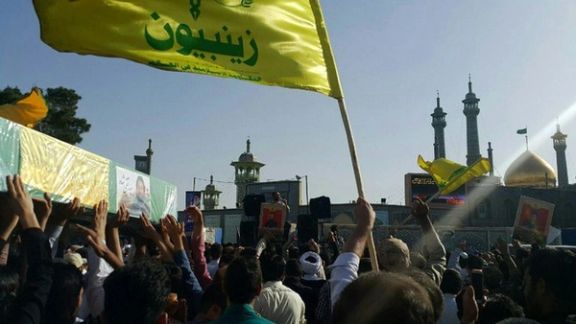
Pakistan’s decision to designate the Zainebiyoun Brigade threatens to further strain ties between Tehran and Islamabad. The two countries witnessed unprecedented tensions in January when the IRGC attacked positions in Pakistan in what it called an attempt to target terrorists. Pakistan retaliated by attacking locations in southeastern Iran.
Days after the mutual attacks, Pakistan's Counter-Terrorism Department (CTD) announced it arrested a suspect in the 2019 assassination attempt on a top Pakistani cleric, saying the suspect was a "trained terrorist" who belonged to the Zainebiyoun Brigade.
Pakistan’s CTD added that Syed Mohammad Mehdi was arrested in an operation at a bazaar in Karachi, accusing him of targeting clerics in the provincial capital and of working for Iranian intelligence.
The insurgent Sunni Baluch group known as Jaish al-Adl (Army of Justice) has been a source of tension between Iran and its nuclear neighbor, Pakistan, for years, labeled as a terrorist organization by Iran, Pakistan, and the United States.
Iranian officials have on several occasions in the past decade, including in 2019, complained that Islamabad has taken no action against the members of Jaish al-Adl finding refuge in its territory despite Iran's provision of relevant information, including locations of the militants’ hideouts.
A militant group advocating for enhanced rights and improved living conditions for the Baluch ethnic minority, Jaish al-Adl has recently intensified its operations against Iranian security forces in Sistan and Baluchistan, an economically challenged province in southeastern Iran adjacent to Afghanistan and Pakistan and home to a substantial Sunni community.
On Tuesday, six law enforcement officers were killed by Jaish al-Adl militants during an ambush on police vehicles along the Sib and Suran county route. The group also launched simultaneous attacks against military posts in Chabahar and Rask last week, killing 16 police forces.

German Foreign Minister Annalena Baerbock called for de-escalation in the region amid an Iran-led proxy war, in a call with his Iranian counterpart.
“No one can have an interest in a wider regional escalation. We urge all actors in the region to act responsibly and exercise maximum restraint,” German Foreign Ministry wrote on X following the phone call with Hossein Amir-Abdollahian on Thursday.
Tensions have risen between Iran and Israel, two archenemies, since Israel’s deadly April 1 strike on the Iranian embassy compound in Damascus and subsequently, Tehran’s daily threats to retaliate. Two IRGC commanders were killed along with other key personnel.
On Wednesday, the foreign ministers of Saudi Arabia, Qatar, Iraq and UAE contacted their Iranian counterpart in an attempt to persuade Tehran to avoid further tensions with Israel.
The mediation of the four Arab countries was conducted at the request of Brett McGurk, the White House Middle East envoy.
Meanwhile, Russia warned all sides against wider tensions in the region.
"Right now it's very important for everyone to maintain restraint so as not to lead to a complete destabilization of the situation in the region, which doesn't exactly shine with stability and predictability," Kremlin spokesperson Dmitry Peskov stressed.
Earlier in the day, Russia told its citizens not to travel to the Middle East amid rising tensions.
Bloomberg reported on Wednesday that a major missile or drone attack by Iran or its proxies on Israel seems imminent in the coming days.
On Thursday, Israeli Prime Minister Benjamin Netanyahu said the country is ready for all scenarios in the region: "Whoever harms us, we will harm them. We are prepared to meet all of the security needs of the State of Israel, both defensively and offensively.”






